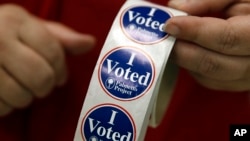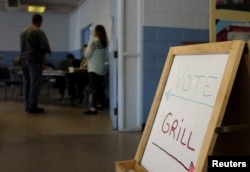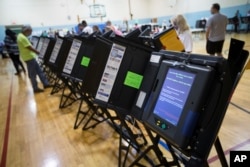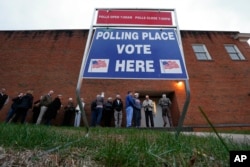What is Super Tuesday?
Super Tuesday is March 1, the day when Democrats and Republicans each compete in primaries and caucuses in at least 11 states and one U.S. territory for presidential nominations.
Voters across the United States select their candidates on different days leading up to their party's convention in July. This Tuesday is called Super Tuesday because it is the day with the most nominating contests on the campaign calendar.
Who votes?
Primaries for Republican and Democratic voters are held in Alabama, Arkansas, Colorado, Georgia, Massachusetts, Minnesota, Oklahoma, Tennessee, Texas, Vermont and Virginia.
Caucus votes are held for Republicans in Alaska and Wyoming.
Democrats in American Samoa, a U.S. territory, and Democrats living abroad also get to vote on Tuesday.
Why is it so important?
Super Tuesday votes account for about one quarter of all delegates to be awarded during the primary elections. It’s the single biggest day of voting in terms of the number of delegates awarded to the candidates.
Why do candidates want to win delegates – not states?
Candidates win by amassing a specific number of delegates who will nominate them at their party’s convention later this year. For the Democrats, that number is 2,383 delegates. For the Republicans, the number is 1,237 delegates.
By law, all Super Tuesday states have to allocate their delegates proportionally. Candidates can still win delegates even if they don’t win the state.
Candidates try to win states because it looks good to the media and voters but ultimately all that matters is winning enough delegates to secure the party nomination.
Why is it called the SEC primary?
The term is actually a reference to American sports. Many of the states holding votes on Tuesday have college football teams that play in the Southeastern Conference (SEC); however, some of the other states voting Tuesday don’t have any connection to that organization and it has no official political meaning.
How will Super Tuesday change the Republican presidential race?
There are still five candidates in the Republican field – the more delegates that are awarded, the more it will become mathematically difficult for some candidates to secure the nomination. A number of candidates who trailed far behind the leaders have already dropped out. It is possible others will do so after the March 1 voting.
“For Republicans who are not happy at the prospect of a (billionaire and Republican front-runner Donald) Trump nomination, there’s still a little bit of time left but the clock is still ticking,” said William Galston, a senior fellow in governance studies at the Brookings Institution.
Super Tuesday is a chance for Trump’s challengers to win primary states – and the delegates that come with those wins. The more delegates they win, the more they can challenge Trump for the nomination.
How will it change the Democratic race?
So far, former Secretary of State Hillary Clinton has won the South Carolina primary and Vermont Senator Bernie Sanders has won the New Hampshire primary. Sanders came close to beating Clinton in Iowa and Nevada.
The large number of delegates awarded could give an enormous amount of momentum to one of the candidates in this two-person race.
Which states are important to watch?
Texas is a key battleground, with the Southern state awarding the highest number of delegates among the states voting on Tuesday.
For the Republicans, some polls show Senator Ted Cruz winning his home state. Other polls show him in a close race with Donald Trump.
“I want to see who wins Texas because I think that will tell us a lot about the future of the party and what happens with Ted Cruz,” said John Feehery, a Republican strategist.
For the Democrats, look for Clinton to do well in Southern states with a large percentage of African-American voters. Sanders is expected to win his home state of Vermont on Tuesday.
What comes next?
A handful of states hold primary and caucus votes on March 5 and 6.
Another major round of voting takes place March 8 and and 15 with contests awarding large numbers of delegates.
Many Republicans are looking to this round to see who is still in the race and could challenge front-runner Donald Trump.
Florida Senator Marco Rubio has to “stay alive until the middle of March, at which point Ohio, Illinois, Florida primaries take place. A couple of those are winner-take-all primaries with a lot of delegates at stake,” said political analyst Stu Rothenberg.
On the Democratic side, Sanders could benefit from a geographic shift in voting.
“Once we get out of states where African-Americans constitute 35, 40, 45 percent of the Democratic primary vote, Bernie Sanders will be better off,” Rothenberg said.







